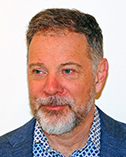
James H. Hurley
University of California, Berkeley
|
Primary Section: 29, Biophysics and Computational Biology Secondary Section: 22, Cellular and Developmental Biology Membership Type:
Member
(elected 2020)
|
Biosketch
James ("Jim") Hurley is a professor in the Department of Molecular and Cell Biology at the University of California, Berkeley. Dr. Hurley uses structural biology, biophysics, biochemistry, and cell biology approaches to understand the structure and function of cell membranes in health and disease. He is known for his work on the structure and mechanism of the ESCRT membrane scission machinery, coated vesicle and endosome biogenesis, lipid transporters and second messenger systems, and the autophagy core complexes. Dr. Hurley was born in Moscow, Idaho and raised in Boulder, CO and Santa Cruz, CA. He graduated in Physics from San Francisco State University and obtained his Ph.D. in Biophysics in 1990 from the University of California, San Francisco. He was a senior investigator in the intramural program of the National Institutes of Health from 1992-2013, and joined the faculty of the University of California, Berkeley in 2013. He is a member of the National Academy of Sciences.
Research Interests
Dr. Hurley's lab currently has four major projects in the general area of mechanistic membrane biology. He has a long-standing interest in the core mechanisms of autophagy, and is currently focusing on the structural and biophysical basis of mitophagy and its role in Parkinson?s Disease. He is investigating the mechanism of membrane scission by ESCRT complexes in the contexts of HIV budding and release from infected cells, autophagy, and membrane repair. In a third project, the hijacking of coated vesicle trafficking by HIV is being worked out by structural, reconstitution, and live cell imaging approaches. Lastly, in the newest project, he is using structural and biochemical approaches to study the roles of the lysosomal GTPase regulatory complexes FLCN-FNIP and C9orf72-SMRC8 in neurodegenerative diseases.

